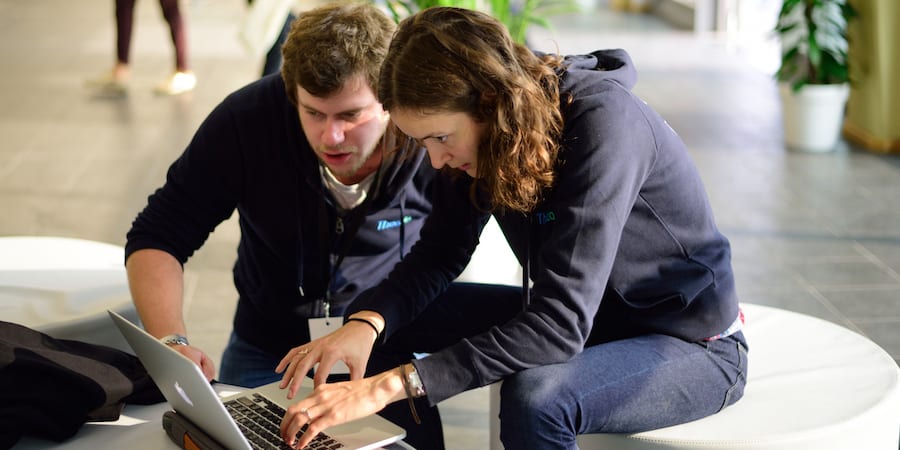
The young firm fulfilling the potential of lean in digital
INTERVIEW – Software development company Theodo is a unique example of a digital company that has fully embraced lean and understood its potential. We caught up with their young CEO and CTO.
Interviewees: Benoît Charles-Lavauzelle, Co-Founder and CEO, and Fabrice Bernhard, CTO, Theodo – Paris, France
Planet Lean: What does innovation mean at Theodo?
Benoît Charles-Lavauzelle: To us at Theodo, every improvement is innovation. It really comes down to respecting everybody’s work: effecting change is hard and every “bit” of it we can achieve deserves to be called an innovation. What are we saying otherwise? That many of the improvements our people come up with are not as good and meaningful as they could be?
This is a compelling debate. Is innovation disruptive or incremental? I don’t know the exact answer to that, but I do think that every innovation – even the most disruptive – is the result of countless inputs (on technology, for instance) that our brains is inspired by and processes. I smile whenever I come across people being super-secretive about “this idea for a new, disruptive business” that they have had, only to then call this to-be revolutionary enterprise “the Uber of” whatever industry they are in.
PL: Young, digital companies like startups often don’t know a lot about lean. Why do you think that is?
Fabrice Bernhard: With his book The Lean Startup, Eric Ries has made the word “lean” very popular in the digital world. Even though lean startup is very far from traditional lean principles, at the moment the two concepts have come to be synonyms in the world of startups and digital firms. And that’s quite the misunderstanding!
BCL: I think we can use this situation to our advantage, however, trying to clarify what lean stands for and help startups see how it can support them.
FB: Another thing (which we have been discussing with Michael Ballé) is that lean helps companies to scale up and grow profitably, but we are not sure a venture-capital environment like Silicon Valley is particularly compatible with lean as an approach.
BCL: That’s a good point. Venture capitalists don’t care about waste. In fact, they live with it all the time: their job is to invest in, say, 10 companies at a time, nine of which will invariably collapse. That’s crazy!
To go back to your question, though, I think there is something else that makes it difficult for digital companies to fully understand “real” lean: the fact that applying it to coding is actually quite hard, because seeing the work is hard. Nobody has cracked it yet – I am not sure anyone has tried, let alone as hard as we are trying – but at Theodo we are hoping to understand how to write code as well as Toyota makes cars. Talk to us again in a year’s time, and hopefully we will have gotten a few breakthroughs.
PL: We will be watching you! In the meantime,however, what have you learned about the contribution that lean can make to digital companies?
BCL: The digital world has more waste than you can imagine. I was recently talking with someone working for a large French bank, who told me they had just found out that only 25% of the features in their App were regularly used by clients.
In digital, we need lean because we are still in the middle ages. We don’t have to reinvent the wheel – lean has successfully been brought to pretty much every other sector already – but we do need to understand how to create more value for customers and how to improve faster as software companies. The current model is not sustainable, and there is no doubt coding will be very different in a few years’ time.
FB: Here’s another interesting thing: more and more people are now talking about coding in terms of “software craftsmanship” rather than “software development”, as a way to recognize the somehow unstructured nature of our work. This idea really helped me connect the dots, as I read more and more books on lean transformations: indeed, what we have at the moment is guilds of craftsmen without a proper structure. What we need going forward, however, is both craftsmanship and structure… and lean is the only way for us to get there.
BCL: True. In fact, that’s even what kaizen means to us: a structured approach to team-based innovation that happens in parallel with reaching mastery of the work.
PL: What could the lean community do to attract more of the young crowd and help them see how big a contribution it can give startups?
BCL: For starters, better understand what Amazon, Facebook, Apple and Google are doing. Those are the companies young people are interested in hearing about, and they are doing a lot of lean thinking, albeit not at the same level of maturity as Toyota. Amazon is perhaps the best example, as we learned from a recent Planet Lean interview with Marc Onetto.
PL: As a software developer, scrum is necessarily a big part of the way you organize the work. Based on what you have learned so far, what are the shortcomings of scrum that lean can overcome?
BCL: There are so many! Agile covers a tiny part of what lean can enable a company to do. We use a lot of it in our company, but we are also very conscious of where it falls short. For example, a scrum team might work with smaller batches of code, but that’s still batching. They might do retrospectives, but they don’t learn structured problem solving. They might (rightly) believe that autonomous teams are better than faulty management, but they don’t engage in real team kaizen. The list goes on and on.
FB: I agree. Fundamentally, what lean gives you that agile can’t is a framework for learning. That’s what we have realized at Theodo, and that’s what we are building our work on.
THE INTERVIEWEES

Read more


COLUMN - For her latest column, Sari Torkkola describes the initial steps that must be taken to move towards becoming a lean CIO and warn us against some of the pitfalls along the way.


CASE STUDY – One-piece flow and a focus on lean leadership and kaizen have allowed the Halfway Production Centre in Johannesburg to turn itself around in just 14 months.


INTERVIEW – Planet Lean talks with Drew Locher about bringing change to an office setting, lean in small- and medium-sized firms and why improving and managing go hand in hand.


CASE STUDY – Italian company El.Co. leveraged digitalization to overcome some key limitations of its manual kanban system while maintaining its pull system intact.

